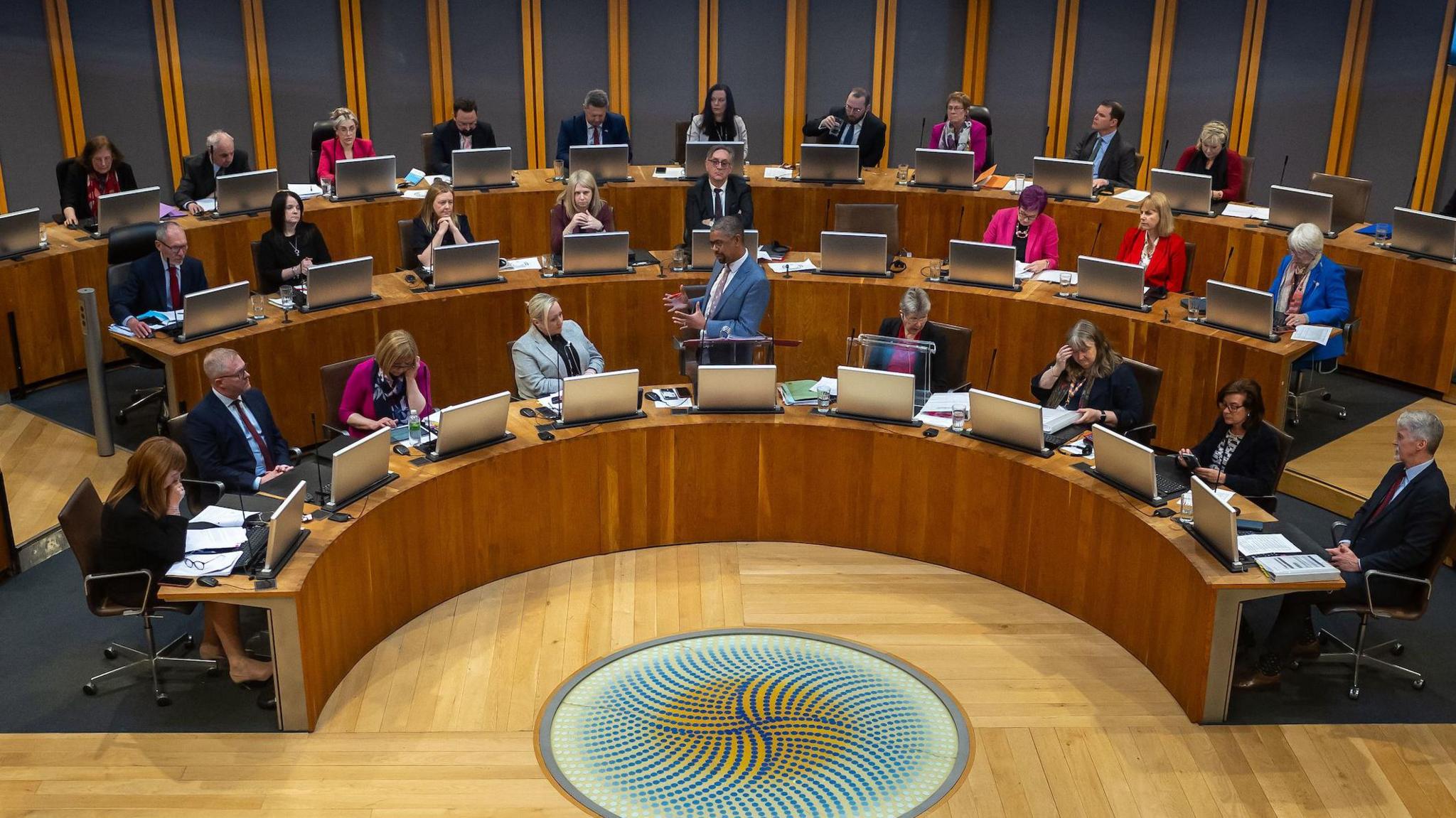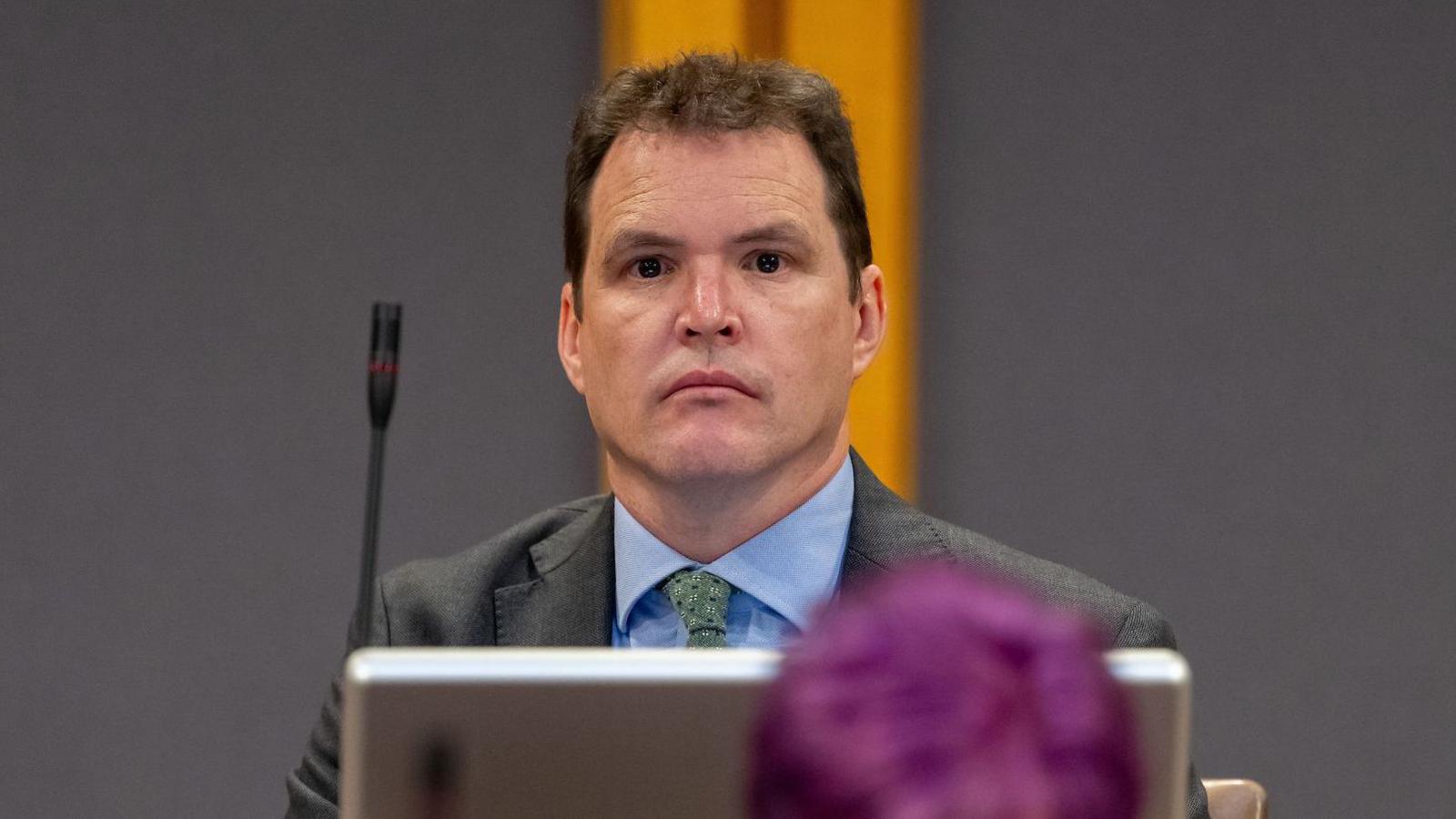Ban on politicians lying could become law in Wales

Senedd politicians could be banned from lying under a law which is under consideration by the Welsh Parliament.
- Published
A ban on Senedd politicians deliberately lying could become law, in part thanks to former Labour minister Lee Waters.
Proposed by former Plaid Cymru leader Adam Price, anyone found to have broken the new offence would be disqualified from being a Member of the Senedd.
The offence has been added to a law passing through the Senedd at a committee with the support of the Conservatives, and after Mr Waters abstained on the amendment.
It is against the wishes of the Labour Welsh government, which has warned the Senedd may not have the powers to pass the legislation, and tried to stop the plan in the committee.
The Welsh government said a "detailed analysis of the policy and legal implications" was required.
The bill - which includes regulations allowing for a pilot for automatically registering voters - has further stages to pass through the Senedd, where ministers may try to have Mr Price's amendment removed.
Former transport minister Mr Waters told BBC Wales that his abstention, rather than a rebellion, was a sign of a maturing Welsh Parliament.
FM must return shocking donation, says ex-minister
- Published1 May 2024
Lee Waters to stand down as transport minister
- Published4 March 2024
Transport minister accuses Tory of encouraging hate
- Published20 March 2024
Under the law, it would be an offence for a Senedd member, or a candidate for election to the Senedd, to wilfully or with intent to mislead make or publish a statement that is known to be false or deceptive.
It would be a defence if it could be "reasonably inferred" to be a statement of opinion, or if it was retracted with an apology given within 14 days.
Proceedings would have to be brought within six months of the date on which the statement was made.
Being prosecuted for such a law would disqualify a person from being a Senedd member.
Adam Price has campaigned for some time for it to be an offence for politicians to intentionally mislead.
He had tried and failed to have the offence added to legislation to expand the size of the Senedd, before it was passed earlier in May.
He successfully tabled an amendment to the Elections and Elected Bodies Bill at the local government and housing committee.
Mr Price and two Conservatives voted with it, while two Labour members of the committee voted against. Mr Waters abstained.

Lee Waters was transport minister until March
Will it happen?
The bill has not yet passed the Senedd and has two further stages of debates to get through.
If the government remains opposed to the law it may try to have the bill amended to have the offence removed.
That could be difficult if the government cannot find opposition support to scrap the offence.
While the Tories supported the offence of deception at committee, it is not clear if they will do in future.
Despite concerns about Mr Price's plan, government ministers have given some support for the idea.
Welsh government's chief legal adviser, Counsel General Mick Antoniw, has previously said that he supported the "general principle", and had referred the matter to the Senedd's standards committee.
Later, First Minister Vaughan Gething said he wanted to "work constructively with all parties to try to have this issue resolved before the next Senedd election".
However, in the Senedd on Tuesday, Mr Antoniw said he was concerned that the amendment purports to resolve a problem but "actually, solely amounts to little more than bad and ineffective law".
He said he had "considerable doubt" that the amendment would "actually work" and would be effective. He said it had not been subject to "normal" scrutiny.
At committee Mr Antoniw also warned that the Senedd cannot legislate to “create offences of a kind dealt with by the Perjury Act 1911”.
Speaking to BBC Wales, Mr Waters argued that the elections bill was a more secure way to ensure the issued was resolved before the next election in 2026, than via a committee bill.
"Rather than a rebellion, I do think this sort of thing is an important part of the Senedd maturing as an institution," he said.
"We’re moving from a county council style of discipline... to a more mature one where government backbenchers table amendments [which used to be prohibited], and also challenge government on committees through scrutiny."
'Democracy under challenge'
Mr Waters told BBC Wales said democracy was “under enormous challenge”.
“I think it's important that we recognise the severity of that and take steps to resist it.
“We don’t accept it from doctors. We don’t accept it from lawyers. Why do we accept it from politicians?”
Mr Price said: “This is a historic step forward as a cross-party Senedd committee has voted in favour of my amendment to make lying by politicians a criminal offence.
"With trust in our political institutions at an all-time low, we need to be pro-active in rebuilding that trust and confidence.
Conservative member of the committee James Evans said: “I think the wider public would respect politicians a lot more, if untruths were untold.”
A Welsh government spokesman said: "The general principle underpinning this amendment, as set out during scrutiny, is an important one.
"However, it will be important for the Senedd and Welsh government to undertake a detailed analysis of the policy and legal implications of the proposals. We will now consider the outcome of the debate as we move forward with this bill.”